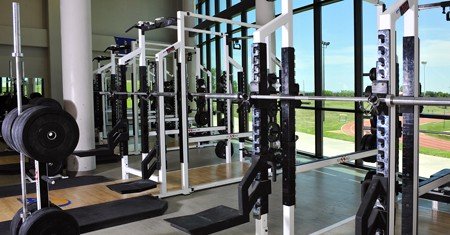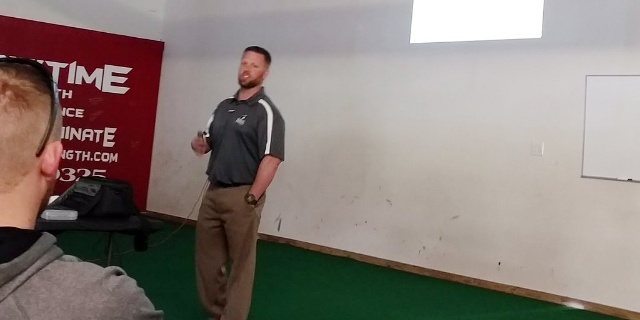What High School Strength Coaches Should and Should Not Take from College S&C
College strength & conditioning is often considered the upper echelon of our field. World class athletes, multi-million dollar facilities, and massive salaries to match. It makes sense then that high school strength coaches try to mimic college strength programs with their own teams. Sometimes this is a great idea, but often times it leads to major problems.
I made the transition to high school strength coach after spending 5 years at the collegiate level. During that time I was fortunate enough to work at several major D1 universities on both the football and Olympic sides. The experience was incredible, and I was able to learn a ton from some of the best mentors in our field. It has also given me a unique perspective on what training looks like at the two levels.What I did not expect when I got to high school was how much different and challenging high school strength and conditioning would be. Technique takes FAR longer to teach. Resources and space is always inadequate. You have to talk to parents!? The job is a completely different animal.
What High School Strength Coaches SHOULD NOT take from the collegiate level.
From the outside looking in college S&C looks like a Rocky montage. The problem is social media and hype videos give a distorted view of what college strength coaching actually is. Here are some mistakes high school strength coaches make when trying to emulate college programs.
- Push the limits, all the time! Most college teams put out a few offseason hype videos each year with their athletes grinding out some of the most intense training sessions imaginable. Prowler pushes, tug of war, competition agility drills, massively heavy squats and cleans, all set to some wicked pump up music. Don’t get me wrong, I love these videos! S&C can be boring, so I am all for getting guys excited about the process.
The problem is that college offseason programs don’t really look like this. There are carefully crafted acclimation periods. There are deload weeks and scientific monitoring protocols. These athletes are also older, more mature, and more gifted (in general) than the athletes on a high school team. If you try to emulate that intensity too early or too often you are just asking to get your athletes hurt. Rule #1 in S&C is do no harm.
- Get fancy. There is some pretty crazy stuff coming out of the S&C social media world. Elaborate setups and crazy exercises may be great when you have an advanced program with highly trained athletes. High school athletes however, are almost always better served by hammering the basic.
When our freshmen came in at the college level, we would spend a minimum of 6 weeks introducing them to the basics of the weight room. I would say a good 75% of them had atrocious form on most of the major compound lifts. Mobility was almost always an issue. That’s in addition to some horrendous movement mechanics. And these were 3, 4, and 5 star athletes!
If those guys needed to hammer out the basics, then so do yours.
- Grind, grind, then grind some more. This one is less about your program, and more about your personal life. College strength coaches love to glorify the grind. 4am alarms, 90+ hour work weeks, low pay. It’s all part of the job!
It may be necessary at some schools to make some or all of these sacrifices, but it sure as heck isn’t healthy. Being miserable does not make you a better coach. It does however, hurt your family and your relationships with your athletes. Work hard, be consistent, be disciplined, but also take care of yourself. As a wise coach once told me, it’s much better to rust out than burn out.
What High School Strength Coaches SHOULD take from the collegiate level
High school strength is a different animal. But not that different. Several things translate very well from the collegiate realm to high school.
- Culture is King. College strength coaches, especially in the football world, are culture creators and drivers. And culture wins championships. Just ask Nick Saban, Dabo Sweeny, Mike Krzyzewski, or any other championship caliber coach.
As a high school strength coach our first job is to build a culture of excellence, hard work, discipline, and toughness. These things win championships, and will be the tools that our athletes use to be successful long after the last whistle is blown.
- Movements over Maxes. That’s the name of Zach Dechant of TCU’s new book. The college strength world has transformed in the last 10-15 years from old school machine circuits to a focus on functional strength. Systems like FMS, Triphasic, RPR, and FRC have evolved the mindset of high school strength coaches to not just look at how strong athletes are, but how well they move and use that strength. Now you see unilateral movements in varying planes of motion. You see coaches hammering technique on the core lifts. You see entire football teams having training sessions devoted to yoga. Some coaches even go as far as throwing out the back squat!
At the high school level movement quality is even MORE important. You are ingraining technique that will last your athletes for years. Create a solid foundation of quality movement and athletes will reap the benefits long after their athletic careers are over. Reinforce bad habits and you can create long lasting damage. The key to the first is to always make quality movement king over all other goals.
- Learn the science. College strength coaches are addicted to the science of performance training. They read, read, and read some more. The better you know the science behind lifting, running, recovery, and motivation, the better you can coach your athletes. With the resources available today through social media and the internet, you can learn anything you want about the field. Dedicate yourself to truly studying the field, and your athletes will benefit.
At the end of the day, I’m not sure there is that big of a difference between a quality collegiate and high school strength program. Both should focus on high quality movement and strength foundations. Both should be balanced in nature. Both should instill discipline, toughness, work ethic, and respect. Stick with the basic, and you’ll never go wrong.
Subscribe to our blog
Subscribe to receive the latest blog posts to your inbox every week.
Related posts

5 Things Every Coach should Know About the Strength & Conditioning Industry

How The NFL Combine Should Change (as told by a strength coach)


